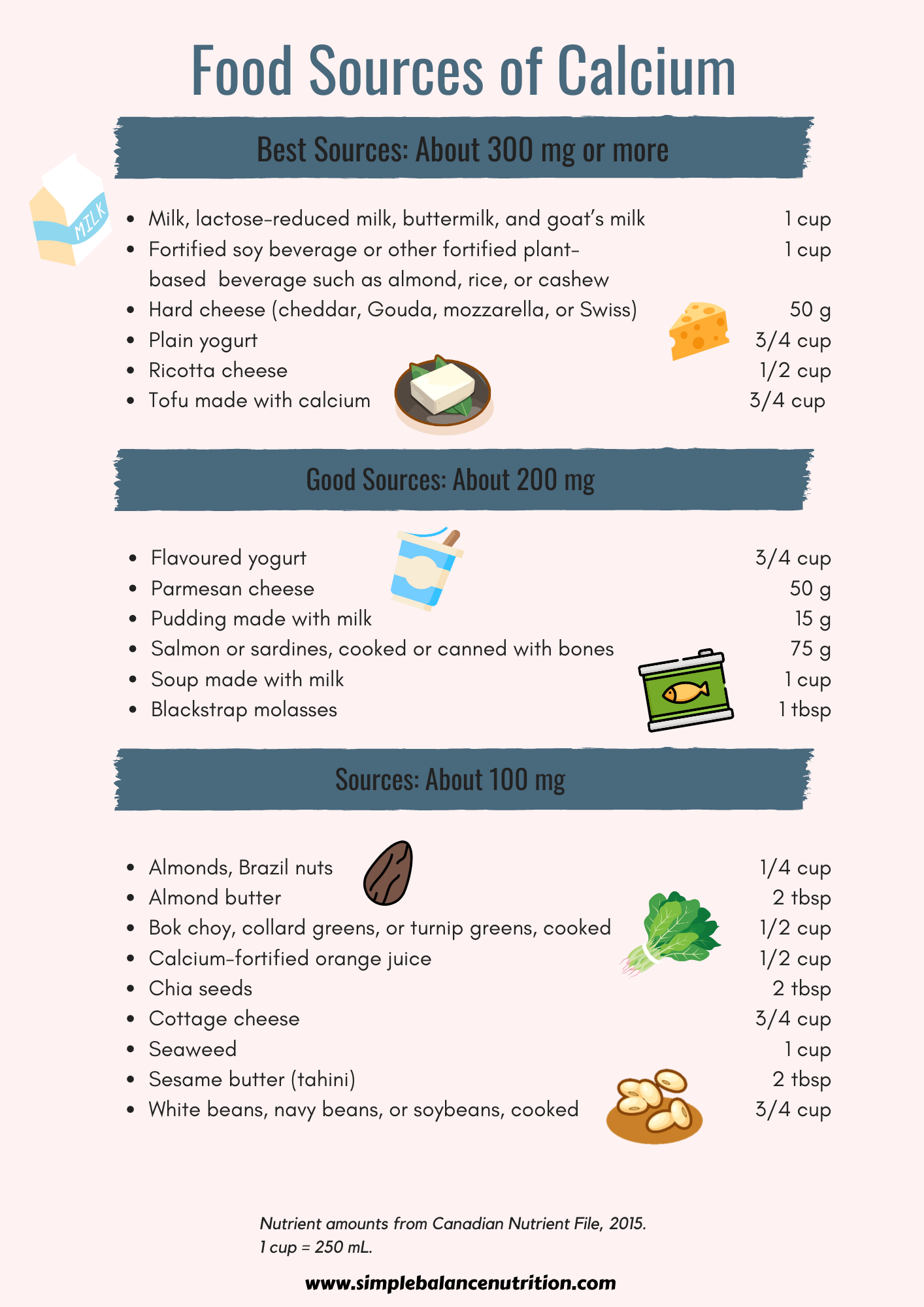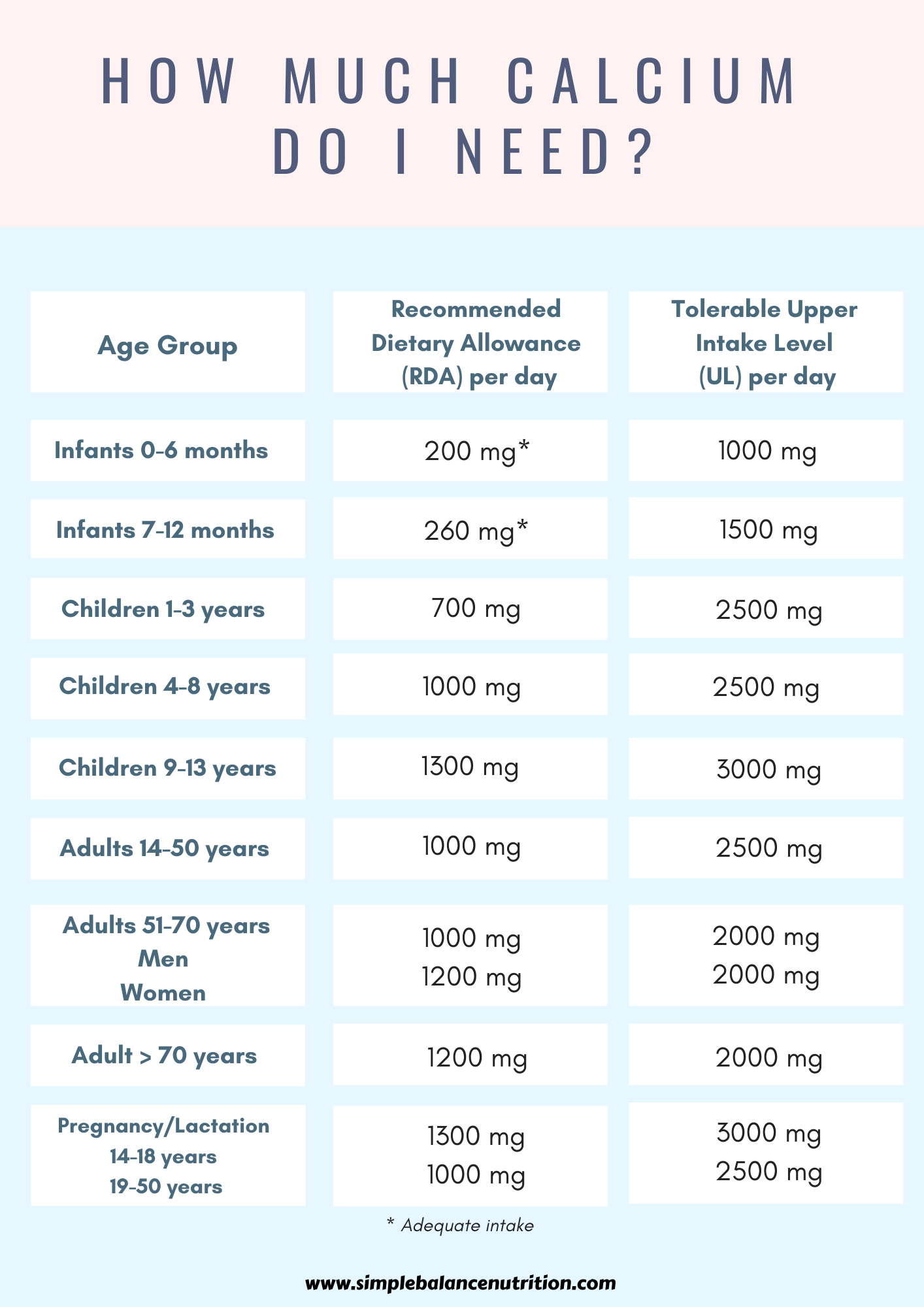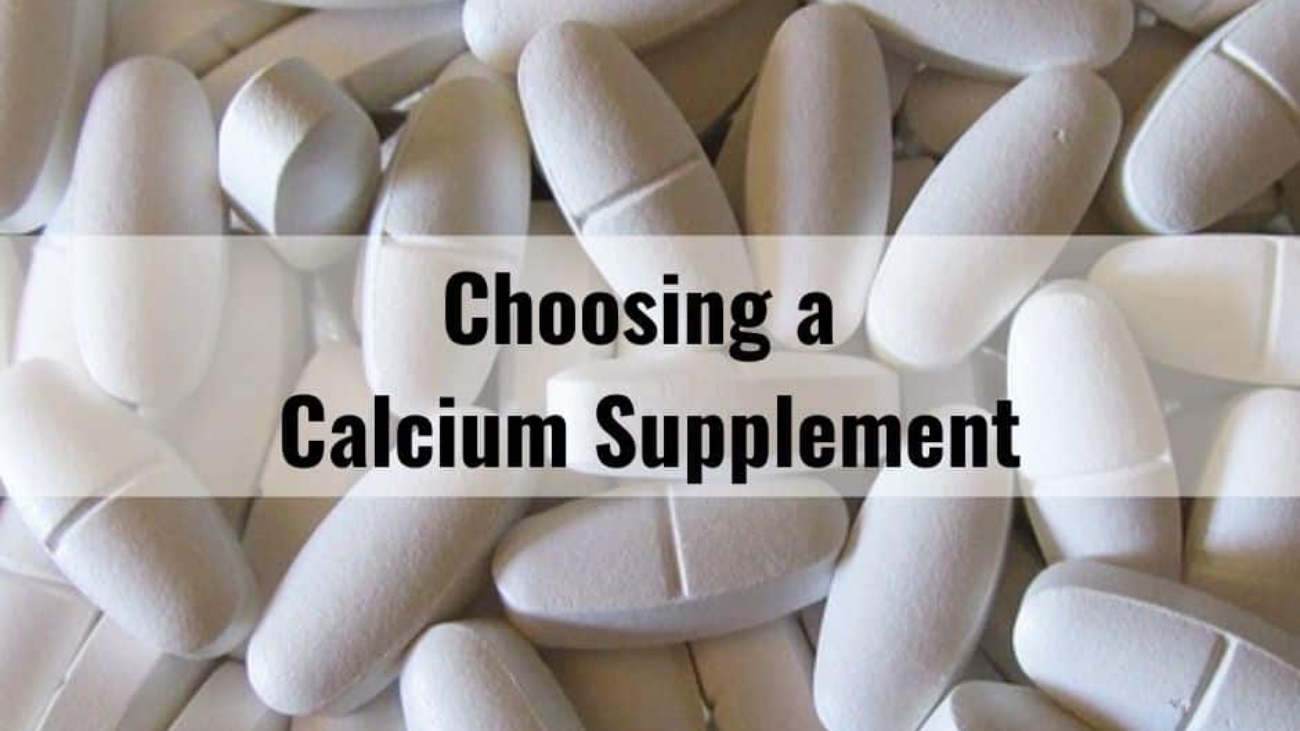WHY IS CALCIUM IMPORTANT?
Calcium is the most abundant mineral in the body. It is key for building and maintaining strong bones and teeth as well as supporting nerve function and muscle contraction. Calcium is also a mineral that is involved in blood pressure and blood clotting. Getting enough calcium is important for preventing osteoporosis, high blood pressure, colon cancer and may even help with premenstrual syndrome.

It’s best to get your calcium from foods; milk, cheese, and dark green leafy vegetables as they are good sources of calcium.
HOW MUCH CALCIUM DO I NEED EACH DAY?
It depends on how much you’re already getting in your diet.
The Recommended Dietary Allowance (RDA) is the total amount of calcium suggested from foods and supplements each day.

The Tolerable Upper Intake Level (UL) is the amount you should not exceed per day between food and supplements to prevent adverse effects.
Did you know that I provide personalized nutrition consultation service? If this is something you’d like to learn more about, please visit here.
TOO MUCH OF CALCIUM?
More than the recommended daily amount isn’t good for you. It may even be harmful. Your body gets rid of extra calcium through your kidneys, and it goes into your urine, raising the risk of kidney stones (Nephrolithiasis) for some people. High levels of the mineral in your blood (Hypercalcemia) can lead to kidney problems (Hypercalciuria), as well as hardened blood vessels and tissue. Some studies also link high calcium intake, particularly from supplements, with a greater risk of heart disease, though the results aren’t settled (here, here, here, here, here, here). High calcium intake can cause constipation. It might also interfere with the absorption of iron and zinc, though this effect is not well established.STEPS TO CHOOSE A CALCIUM SUPPLEMENT
The best supplement is the one that meets your needs based on tolerance, convenience, cost and availability. Calcium supplements are available with and without a prescription in a wide range of preparations (i.e. tablets, chews, and liquids) and in various strengths.
- To choose a good calcium supplement, first look for brand names you recognize.
- IF YOU ARE IN CANADA: Be sure to check the bottle for a Natural Product Number (NPN). This means that the product has been assessed by Health Canada and is considered safe, effective and high quality. Avoid buying supplements over the Internet or outside of Canada. There is no guarantee that they have met the safety standards set by Health Canada. which indicates that the product meets quality control standards.
- IF YOU ARE IN MALAYSIA: check out this post about what you should look for when choosing supplements.
- The calcium in supplements is found in combination with another substance, typically carbonate or citrate.
- Bypass those made from calcium phosphate, calcium lactate or calcium gluconate, because these contain only small amounts of “elemental calcium” (the actual amount of calcium in each supplement), less common and tend to be more expensive
- Calcium carbonate tends to be the best value, because it has the highest amount of elemental calcium. The compound calcium carbonate contains 40% calcium by weight, while calcium citrate is 21% calcium. This means that you may need to take more tablets of a calcium citrate product in order to meet your daily needs.
- Calcium carbonate requires extra stomach acid for absorption, it’s best to take with food. Most people tolerate calcium carbonate well. However, some people might experience gastrointestinal side effects including gas, bloating, constipation, or a combination of these symptoms.
- Calcium citrate is absorbed more easily than calcium carbonate and can be taken on an empty stomach.
- Calcium citrate is preferred in patients receiving proton pump inhibitors, are taking acid-blocking medication, or have decreased stomach acid (bariatric patients) since these medications reduce the acid in the stomach, thus making calcium carbonate harder to absorb.
- Another advantage of calcium citrate is that it may cause less gas, bloating and constipation than calcium carbonate.
- Steer clear of products containing oyster shell, bone meal or dolomite, because these ingredients can potentially be contaminated with lead or other toxic metals.
- If you are not keen on swallowing pills you can also consider a liquid or chewable calcium supplement.
- Regardless of which calcium supplement you choose, be sure to look at the label carefully to assess the dose in each calcium pill. Look on the side of the package or container to find out how much elemental calcium is in each supplement.
- The more calcium you take at one time, the harder it is for your body to process it. Aim for 500 milligrams or less each time. You may want to take a smaller amount at each meal throughout the day to add up to your total.
- Try to stay close to the recommended daily allowance of calcium for your age, and do not exceed the upper-level limit.
WHAT FACTORS INFLUENCE CALCIUM ABSORPTION?
- Vitamin D
- Dose
- Iron
- Sodium
- Caffeine
- Phytic acid & oxalic acid
Phytic acid naturally found in foods such as whole grains, beans and nuts as well as oxalic acid found in foods such as spinach, sweet potatoes, rhubarb and beans can reduce calcium absorption. If you are consuming a varied diet there is little reason to worry about the interactions.
- Medications

